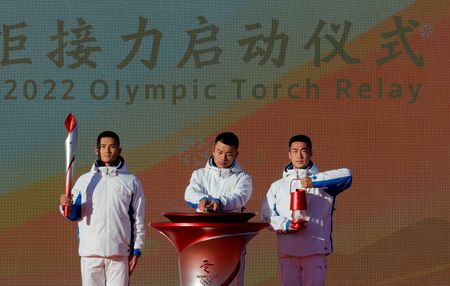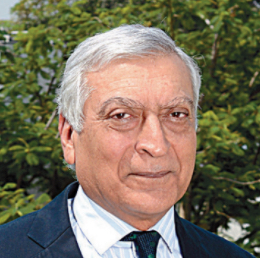
India’s Diplomatic Boycott of the Winter Games – A Slap on China’s Wrist

China’s decision to make Army Colonel Qi Fabao who fought with Indian forces in the Galwan Valley in Ladakh in June 2020 an Olympic torch bearer at the Winter Games in Beijing this month violates many norms.
It violates the Olympic spirit, which is to build peace in the world through sports. Choosing a soldier who took part in China’s aggression against another country scoffs that spirit blatantly. This is not a message of peace building but one of sanctifying conflict and war.
If a country wants to honour the sacrifice of its soldiers in a conflict with another country it can do so in a national ceremony, as all countries do. The Olympic torch is not a national torch. It was lit on October 18 in Greece and transported to Beijing for travelling within the host country. It ought not to be used to accord a national honour to men in uniform involved in armed clashes with another country. This is co-opting the torch that has an international import for purely internal political purposes.
China for long did not acknowledge its casualties in the Galwan Valley clash, even as India immediately announced the loss of 20 soldiers and honoured them nationally. Faced with an internal backlash it admitted months later to 4 dead. Some Chinese on social media contrasted the transparency on the Indian side and the public honours accorded to those who died with the silence and secrecy on the Chinese side. The CCP subsequently launched a domestic campaign to highlight the “sacrifices” of these heroes to defend the country’s territorial integrity and used this to stoke nationalist feelings and assert sovereignty rights over Indian territory. The honour accorded to Colonel Qi Fabao is part of this propaganda campaign.
This is mixing politics with sport, something that China has railed against after the announcement of a diplomatic boycott of the games by the US, followed by the UK, Australia, Japan and a few other countries in protest against the gross violation of human rights of the Uighurs. It is pity though that the Western diplomatic boycott was not more broad-based. Major EU countries did not join. This only exposes the divisions in the West on China which it profits from. Europe has made human rights and democracy as core elements of its foreign policy on both these counts. This was an occasion to send a powerful message to Xi Jinping’s China. No wonder China defiantly chose an Uighur skier Dinigeer Yilamujiang as one of the athletes to light the Olympic cauldron at the Games. This too is political messaging to the international community at a sporting event.
The Chinese decision is a deliberate affront to India. It confirms once again China’s disregard for Indian sensitivities and habit of baiting India. Knowing that India is participating in the games, honouring Colonel Qi Fabao in this conspicuous manner was a deliberate act.
India, in fact, despite the continuing standoff in Ladakh and the announcement of the diplomatic boycott of the games by the US, made a gesture to China by joining it and Russia in the Russia-India-China (RIC) meeting at Foreign Minister’s level in November 2021 to support Beijing’s hosting of the Winter Olympic Games. This was a signal to the US that India will not join any diplomatic boycott of the Games. The Global Times had used this gesture by India to its propaganda advantage by commenting that India’s support showed that it is not a natural US ally.
That India marked its support for the Winter Games in the RIC was somewhat surprising, as it was a diplomatic gift to China in view of the pressure building up for a diplomatic boycott of the games in the West. China would have no doubt pressed for including a supportive reference in the joint statement to counter the US-led offensive, but India could have chosen not to give any explicit support and kept a neutral posture.
Two considerations would have weighed with India in extending support. One, the US decision to boycott the games is on account of gross human rights violations of the Uighurs in Xinjiang by China. India’s principled position has been against politicization of human rights and it has abstained on resolutions in the UNHRC on human rights issues on which the West has all along displayed double standards. India itself has been a victim of the West’s human rights campaigns. In supporting the games in the communiqué India was distancing itself from the reasons for the US boycott decision.
Two, the political investment of Russia in these games would have been a factor. Russia would have wanted India’s support as it was attaching high political importance to the games. President Putin’s presence at them had already been announced to show solidarity with China and have summit talks. The irony is that the Russian contingent at the games was not participating under the Russian flag because of the continuing ban on Russia by the International Olympic Committee. The Russian President chose to be present at the opening ceremony even when the Russian athletes are not allowed to carry the Russian flag. He was willing to overlook this affront. Given Russia’s position India would have decided to oblige Russia by joining in a positive reference to the games.
The Chinese provocation to field Colonel Qi Fabao as a torch bearer could not be ignored by India, which termed as regrettable the Chinese side fielding a military officer involved in in the Galwan clash and choosing to politicize the event. India announced that its Chargé d’Affaires in Beijing would not be attending the opening and closing ceremonies in protest. This Indian boycott is distinct from the reasons for the boycott of the US and others. It follows a bilateral provocation and not the human rights situation in China.
The Indian decision in effect joins a diplomatic boycott of the games and rightly administers a slap on China’s wrist. That two US senators have welcomed it is not surprising. China is too imbued with a sense of power to be deterred from provoking India whenever it chooses to do so. Russia has publicly expressed its intention to assist China and India to resolve their current stand-off in Ladakh, and even work for a RIC summit. China’s rebuff to India at the Winter Olympics hardly helps Russia’s plans.
**********************
Disclaimer
The opinions expressed in this article are the author’s own and do not reflect the views of Chanakya Forum. All information provided in this article including timeliness, completeness, accuracy, suitability or validity of information referenced therein, is the sole responsibility of the author. www.chanakyaforum.com does not assume any responsibility for the same.
Chanakya Forum is now on . Click here to join our channel (@ChanakyaForum) and stay updated with the latest headlines and articles.
Important
We work round the clock to bring you the finest articles and updates from around the world. There is a team that works tirelessly to ensure that you have a seamless reading experience. But all this costs money. Please support us so that we keep doing what we do best. Happy Reading
Support Us





















POST COMMENTS (1)
Sandeep Singh